视译的基本原则
简介&依序翻译
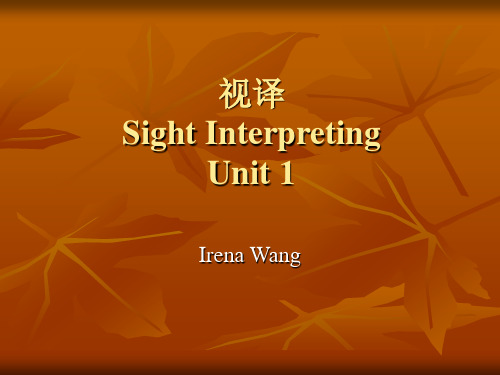
汉语译文分解如下 总的来说,// 男生//在数学推理、// 机械技术//和解决问题 1 2A 3 4 5 等方面//的测试中成绩较高。 2B 汉语译文的语序:1+2A+3+4+5+2B 进一步分解英文句子,按尽量保持原文语序原则进行翻译:
原文语序
On the average, that measure mathematical reasoning, mechanical ability and problem solving skills.
视译的基本要求和首要原则
基本要求: 翻译的速度与发言者的速度保持同步
首要原则: 译出语语序与译入语语序基本保持一致
* 在视译中为了尽量保持原文语序、确保翻译速度
所作的一些调整,有时可能会对原文的意思有所 影响,会出现意义重心略有偏移的情况,但是, 这些调整在总体上不影响发言人的原意,在视译 和同传的“忠实度”之内,因此,是可以接受的。
measure mathematical reasoning, mechanical ability, and problem solving skills. 译文1:总的来说,男生在数学推理、机械技术和解决问 题等方面的测试中成绩较高。 该例句可分解如下: On the average, // male students score higher on tests // that 1 2 measure mathematical reasoning, mechanical ability, and 3 4 problem solving skills. 5 英文原文语序是:1+2+3+4+5
视译
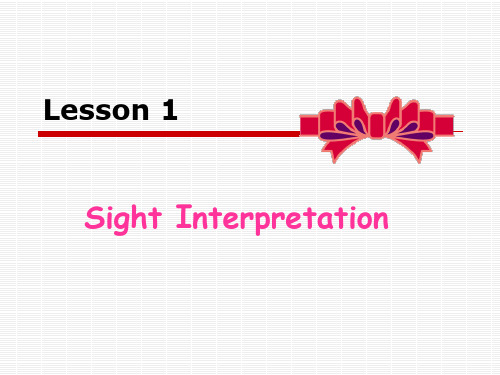
Member states identified human rights as a central issue for the future agenda of the Organization and of the world community in general.
该厂生产的产品物美价廉。
Virtually all governments have taken significant steps to widen the role of private enterprise in economic activity.
各国政府大都采取了重大步骤来扩大私人企业 的作用,在经济活动方面的作用。
两国关系疏远了多年。
APEC will have to be nondiscriminatory to any country.
亚太经合组织对所有国家必须一视同仁。
视译注意事项:
不要回头重说(backtrack)。 译者ห้องสมุดไป่ตู้阅读视译材料时应留出一定的视觉距
离(perceptual span),比如阅读的视觉进度 要领先于口头的翻译进度(read ahead),加 强信息的处理,避免重新组织整个句子的各个 要素。 若是有遗漏重要的信息,可另起一句话补足意 思。
*感谢 gratitude grateful appreciation/appreciate
*亲眼目睹 witness
*深感荣幸 it’s my honor I feel honored
*我谨代表 on behalf of
*热情好客 hospitality courtesy
英汉汉英视译教程ppt课件
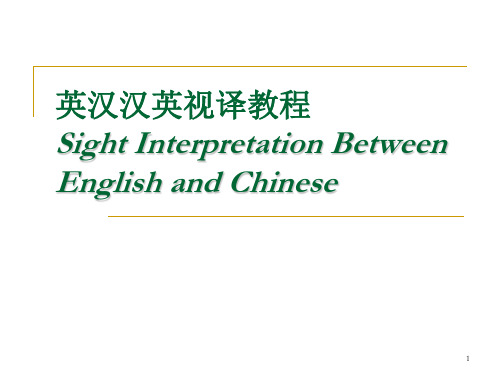
译员在书写译文之前往往已经对原文进行了视译,
而且很可能不止一次地视译原文。这对口译译员
来说更是如此。很多情况下,书面发言稿是在活
动开始前的最后一刻才迟迟送达译员手中。译员
根本没有充裕的时间事先将其翻成译文,而只能
在讲话人念稿的同时匆匆浏览一下文章的内容,
因此视译是所有从事口译工作者的基本功。交替
传译和同声传译中的视译一般有以下几种情形:
号不够周全, 都会造成译文逻辑混乱,漏洞百出。
可见译员在确保信息处理质量的前提下,应不断
提高处理信息数量的能力。视译信息数量的处理
能力是视译信息质量处理能力的组成部分, 这是
视译的时效性决定的。
16
序言
3. 补充遗漏信息。一旦遗漏了重要信息,无
论是词语还是语句,可另外补加一句译文,补足
其意。但是,除非万不得已,应尽量避免在句子
了从视译角度提供了充分的解析之外,我们还同时
从其他角度提出了具有实用性和探索性的翻译见解。
我们殷切希望本教材的问世能够引发业界师生们的
深刻思考,使当前我国视译或口译教学效率低下的
现实有所改观,从而开创外语教学的新局面。
鉴于作者学识和经验所限,本教程定有诸多缺
憾,甚至谬误之处,诚请各位同仁不吝赐教。谨此
果适度迁就时间便是唯一的出路。
11
序言
2. 语意为先,语言为后。视译翻译效果包含
两个方面:语言效果和语意效果,语言效果和语
意效果俱佳是最理想的境界。但是,由于种种因
素作祟,语言效果和语意效果常常不能两全,此
时只能适度牺牲语言效果,以便最大限度地追求
译文语意的质量。
12
言
3. 实词为重,虚词为轻。视译时的阅读和思
同声传译
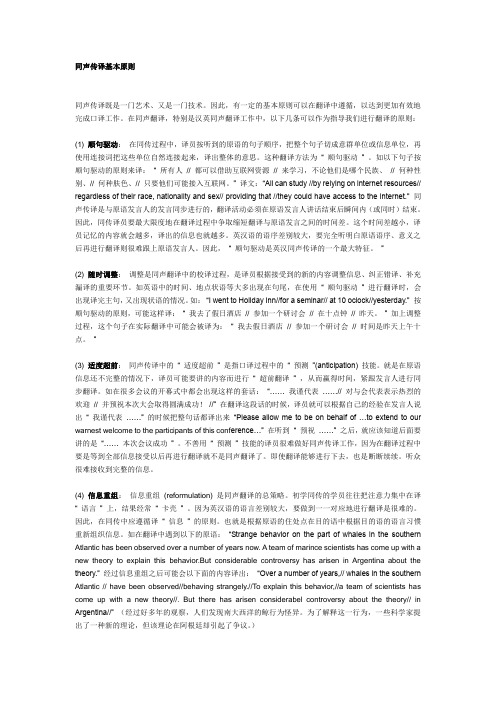
同声传译基本原则同声传译既是一门艺术、又是一门技术。
因此,有一定的基本原则可以在翻译中遵循,以达到更加有效地完成口译工作。
在同声翻译,特别是汉英同声翻译工作中,以下几条可以作为指导我们进行翻译的原则:(1) 顺句驱动:在同传过程中,译员按听到的原语的句子顺序,把整个句子切成意群单位或信息单位,再使用连接词把这些单位自然连接起来,译出整体的意思。
这种翻译方法为“ 顺句驱动” 。
如以下句子按顺句驱动的原则来译:“ 所有人// 都可以借助互联网资源// 来学习,不论他们是哪个民族、// 何种性别、// 何种肤色、// 只要他们可能接入互联网。
” 译文:“All can study //by relying on internet resources// regardless of their race, nationality and sex// providing that //they could have access to the internet.” 同声传译是与原语发言人的发言同步进行的,翻译活动必须在原语发言人讲话结束后瞬间内(或同时)结束。
因此,同传译员要最大限度地在翻译过程中争取缩短翻译与原语发言之间的时间差。
这个时间差越小,译员记忆的内容就会越多,译出的信息也就越多。
英汉语的语序差别较大,要完全听明白原语语序、意义之后再进行翻译则很难跟上原语发言人。
因此,“ 顺句驱动是英汉同声传译的一个最大特征。
”(2) 随时调整:调整是同声翻译中的校译过程,是译员根据接受到的新的内容调整信息、纠正错译、补充漏译的重要环节。
如英语中的时间、地点状语等大多出现在句尾,在使用“ 顺句驱动” 进行翻译时,会出现译完主句,又出现状语的情况。
如:“I went to Holiday Inn//for a seminar// at 10 oclock//yesterday.” 按顺句驱动的原则,可能这样译:“ 我去了假日酒店// 参加一个研讨会// 在十点钟// 昨天。
实务翻译期末重点总结归纳
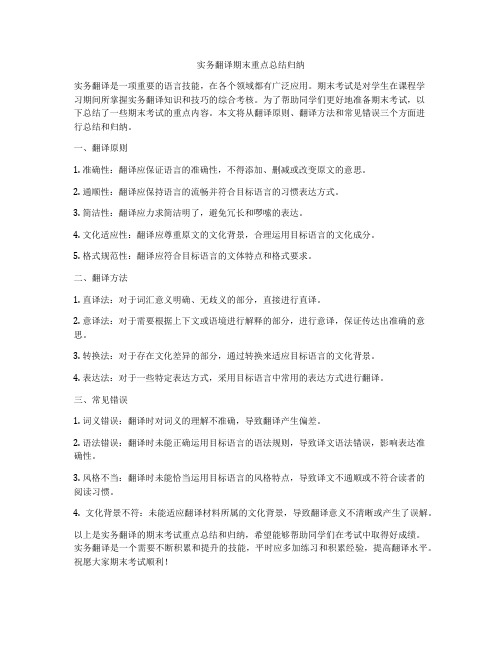
实务翻译期末重点总结归纳实务翻译是一项重要的语言技能,在各个领域都有广泛应用。
期末考试是对学生在课程学习期间所掌握实务翻译知识和技巧的综合考核。
为了帮助同学们更好地准备期末考试,以下总结了一些期末考试的重点内容。
本文将从翻译原则、翻译方法和常见错误三个方面进行总结和归纳。
一、翻译原则1. 准确性:翻译应保证语言的准确性,不得添加、删减或改变原文的意思。
2. 通顺性:翻译应保持语言的流畅并符合目标语言的习惯表达方式。
3. 简洁性:翻译应力求简洁明了,避免冗长和啰嗦的表达。
4. 文化适应性:翻译应尊重原文的文化背景,合理运用目标语言的文化成分。
5. 格式规范性:翻译应符合目标语言的文体特点和格式要求。
二、翻译方法1. 直译法:对于词汇意义明确、无歧义的部分,直接进行直译。
2. 意译法:对于需要根据上下文或语境进行解释的部分,进行意译,保证传达出准确的意思。
3. 转换法:对于存在文化差异的部分,通过转换来适应目标语言的文化背景。
4. 表达法:对于一些特定表达方式,采用目标语言中常用的表达方式进行翻译。
三、常见错误1. 词义错误:翻译时对词义的理解不准确,导致翻译产生偏差。
2. 语法错误:翻译时未能正确运用目标语言的语法规则,导致译文语法错误,影响表达准确性。
3. 风格不当:翻译时未能恰当运用目标语言的风格特点,导致译文不通顺或不符合读者的阅读习惯。
4. 文化背景不符:未能适应翻译材料所属的文化背景,导致翻译意义不清晰或产生了误解。
以上是实务翻译的期末考试重点总结和归纳,希望能够帮助同学们在考试中取得好成绩。
实务翻译是一个需要不断积累和提升的技能,平时应多加练习和积累经验,提高翻译水平。
祝愿大家期末考试顺利!。
口译基础知识和技巧8.视译

从句法的角度来看,视译(口译),尤 其是英译汉,通常遵循顺句驱动的原则。
原文:One great benefi allows us to move information online that now reside in paper form.
口译基础知识和技巧8.视译
视译前译员通常可以拿到讲话稿,多数情况下 译员需和说话人同时传递信息,也可称为有稿 同传。虽然比无稿同传要轻松,但译员的口译 要更加准备,信息要更加完整。
首先,时间充裕的情况下,可以通过不同渠道 如网络了解相关背景知识,查询所涉及的专业 词汇的表达方法。
其次,在讲话稿上要做相应的处理,如:
译文(1):网络的重大优势之一是,它允许我们 把信息放在网络上,而这些信息现在是出现在 纸上。
译文(2):网络的重大优势之一是,它允许我们 把那些现在纸上的信息放在网络上。
谢谢观赏
谢谢观赏
(1) 尽管原稿已有标点符号作为自然分截点, 译员要利用斜线以译文的要求再次断句。
(2) 若原文顺序与译文顺序不符,标出需要调 整的位置和部分。
(3) 找出表达成目的语时所要求的句子的主干 成分,如主语、谓语等。
(4) 找出关键信息,如数字、重要的专有名词 等,甚至标出表达方式。 (5) 找出译文的句子之间的逻辑关系。
口译中的_顺句驱动_原则及_视译_和_听译_教学法
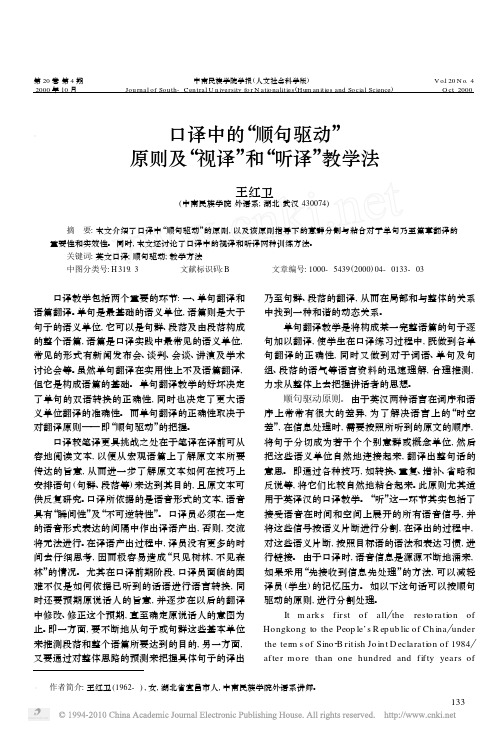
第20卷第4期 中南民族学院学报(人文社会科学版) V o l.20N o.4 2000年10月 Journal of South-Central U niversity fo r N ati onalities(H um anities and Social Science) O ct.2000α口译中的“顺句驱动”原则及“视译”和“听译”教学法王红卫(中南民族学院外语系;湖北武汉430074)摘 要:本文介绍了口译中“顺句驱动”的原则,以及该原则指导下的意群分割与粘合对于单句乃至篇章翻译的重要性和实效性。
同时,本文还讨论了口译中的视译和听译两种训练方法。
关键词:英文口译;顺句驱动;教学方法中图分类号:H319.3 文献标识码:B 文章编号:1000-5439(2000)04-0133-03 口译教学包括两个重要的环节:一、单句翻译和语篇翻译。
单句是最基础的语义单位,语篇则是大于句子的语义单位,它可以是句群、段落及由段落构成的整个语篇,语篇是口译实践中最常见的语义单位,常见的形式有新闻发布会、谈判、会谈、讲演及学术讨论会等。
虽然单句翻译在实用性上不及语篇翻译,但它是构成语篇的基础。
单句翻译教学的好坏决定了单句的双语转换的正确性,同时也决定了更大语义单位翻译的准确性。
而单句翻译的正确性取决于对翻译原则——即“顺句驱动”的把握。
口译较笔译更具挑战之处在于笔译在译前可从容地阅读文本,以便从宏观语篇上了解原文本所要传达的旨意,从而进一步了解原文本如何在技巧上安排语句(句群、段落等)来达到其目的,且原文本可供反复研究。
口译所依据的是语音形式的文本,语音具有“瞬间性”及“不可逆转性”。
口译员必须在一定的语音形式表达的间隔中作出译语产出,否则,交流将无法进行。
在译语产出过程中,译员没有更多的时间去仔细思考,因而极容易造成“只见树林,不见森林”的情况。
尤其在口译前期阶段,口译员面临的困难不仅是如何依据已听到的话语进行语言转换,同时还要预期原说话人的旨意,并逐步在以后的翻译中修改、修正这个预期,直至确定原说话人的意图为止。
(完整版)视译技巧

(完整版)视译技巧顺句驱动,译完后迅速转向下一个视幅(eye span)所及(coherence)和可接受性。
----断句、顺句驱动、灵活整合。
这些技能可同时增强对语篇的分析能力和口阅读与分析扩大词汇量,提高迅速挑出主语和谓语动词,快速确定核心意思,(1)HEATHROW, London’s main airport, is normally throngedcross people in queues at this time of year. But on(蜿蜒的,and the people in them more anxious than(抱怨的) as news spread that the police and(阻a plot to blow up a dozen planes bound for America.HEATHROW;谓语动词:thronged;逻辑转折词:But,抓大意而不是拘泥于组成句子的单个字/词的字面意思。
(meaning group or sense group)英语的每一个句子结构都有一个至若干个“意义单,由各种语法或非语法衔接手段联结组成句子结构,注(2)To drive just a mile from the shore where a tsunami came你只要驾车到一周前海啸咆哮而过的海滩周围一英按照这句话的语法(deverbalization)。
因此要加大练习量,让学生更好地理找出每一节(segment)的意义还可以简化句子结自然会从意义结构上着手理解、翻:驾车到海滩边一英里的地方,这里一你会感受到风暴过后一片死寂。
(更才能进一步训练断句基础上的/话语的切分是基于理解而不对话语的感知是序列词汇,但是译员不可能下面的误译就是机械地断(3)On a farm, children help with the pigs or chicken.(4)Like many other fishermen, /doc/b818741051.html,santhe has known only Lasanthe先生只知道海。
视译经典教程

视译经典教程的翻译技巧视译是指在同声传译中,视稿译员在听取发言人的发言并观察其语调、语速和肢体语言的同时,将发言人的意思传达给听众。
视译是一项高难度的技能,需要具备扎实的双语能力和丰富的口译经验。
在视译经典教程中,翻译技巧是其中的重要组成部分,可以帮助译者更好地理解和表达发言人的意思。
1. 理解原文:在视译过程中,理解原文是至关重要的第一步。
译员需要仔细听取发言人的发言,分析其语调、语速和肢体语言,以便更好地理解原文的意思。
同时,译员还需要注意发言人的措辞和表达方式,以便准确地传达其意思。
2. 笔记技巧:视译需要快速的笔记技巧。
在听取发言人的发言时,译员需要快速记录关键信息,如人名、地名、数字、时间等。
同时,笔记还需要简洁明了,以便于后续的翻译过程。
在翻译过程中,笔记可以帮助译员回忆起发言人的原意,确保翻译的准确性和连贯性。
3. 翻译技巧:视译需要灵活运用各种翻译技巧,如增译、减译、转译、重构等。
在发言人的发言较长或较为复杂的情况下,译员需要适当地增加或减少某些词语或句子,以便更好地传达发言人的意思。
同时,在遇到难以理解的表达方式或专业术语时,译员需要重构原文的意思,以便于听众的理解。
4. 表达方式:视译需要注重表达方式的多样性,如口语化表达、书面语表达等。
在翻译过程中,译员需要根据听众的背景和需求,选择合适的表达方式,以便更好地传达发言人的意思。
同时,表达方式还需要符合译员的口音和语言风格,以便于听众的接受和理解。
通过以上技巧的学习和应用,译者可以更好地理解和表达发言人的意思,确保翻译的准确性和连贯性。
同时,这些技巧还可以帮助译者提高双语能力和口译经验,为未来的口译工作打下坚实的基础。
除了以上技巧外,视译经典教程还提供了其他方面的指导,如心理素质、时间管理、听力训练等。
这些方面的训练可以帮助译者更好地应对紧张的口译工作,提高自己的综合素质和能力。
总之,视译是一项高难度的技能,需要不断学习和实践才能掌握。
8、口译中的视译

口译基础知识与技巧8口译中的视译技巧视译前译员通常可以拿到讲话稿,多数情况下译员需和说话人同时传递信息,也可称为有稿同传。
虽然比无稿同传要轻松,但译员的口译要更加准备,信息要更加完整。
首先,时间充裕的情况下,可以通过不同渠道如网络了解相关背景知识,查询所涉及的专业词汇的表达方法。
其次,在讲话稿上要做相应的处理,如:(1) 尽管原稿已有标点符号作为自然分截点,译员要利用斜线以译文的要求再次断句。
(2) 若原文顺序与译文顺序不符,标出需要调整的位置和部分。
(3) 找出表达成目的语时所要求的句子的主干成分,如主语、谓语等。
(4) 找出关键信息,如数字、重要的专有名词等,甚至标出表达方式。
(5) 找出译文的句子之间的逻辑关系。
另外,视译中要注意速度尽量均匀,而不是碰到好表达的就速度加快,这样容易造成后面的停顿过多。
要注意注意力分配,口中在表达前一句时,眼睛应尽量滑动到下一句了。
从句法的角度来看,视译(口译),尤其是英译汉,通常遵循顺句驱动的原则。
由于口译中译员接受信息时是按时间顺序逐步进行的,即ABCD,但可能翻译入语的表达习惯是CABD,可是又不允许译员有过多的停顿,所以译员还要尽量按照ABCD的顺序来口译。
在口译句(1)、(2)、(3)时通常采取译文(1)的翻译方法,而若是笔译可能多采用译文(2)。
(1)One great benefit of the web is that it allows us to move information onlinethat now reside in paper form.译文(1):网络的重大优势之一是,它允许我们把信息放在网络上,而这些信息现在是出现在纸上。
译文(2):网络的重大优势之一是,它允许我们把那些现在纸上的信息放在网络上。
分析:若按顺句的原则,句(1)中that引导的定语从句独立成句,但需要重复原文定语从句的先行词information,口译时并添加相应的指示语,即“这些信息”,以保证连贯。
视译的基本原则
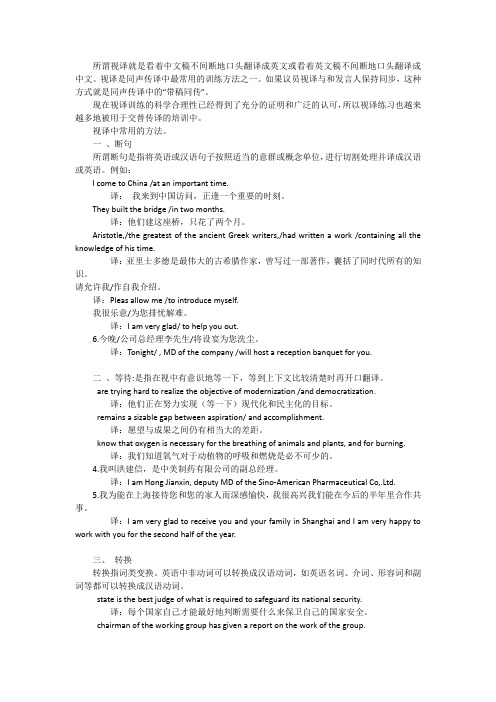
所谓视译就是看着中文稿不间断地口头翻译成英文或看着英文稿不间断地口头翻译成中文。
视译是同声传译中最常用的训练方法之一。
如果议员视译与和发言人保持同步,这种方式就是同声传译中的“带稿同传”。
现在视译训练的科学合理性已经得到了充分的证明和广泛的认可,所以视译练习也越来越多地被用于交替传译的培训中。
视译中常用的方法。
一、断句所谓断句是指将英语或汉语句子按照适当的意群或概念单位,进行切割处理并译成汉语或英语。
例如:I come to China /at an important time.译:我来到中国访问,正逢一个重要的时刻。
They built the bridge /in two months.译:他们建这座桥,只花了两个月。
Aristotle,/the greatest of the ancient Greek writers,/had written a work /containing all the knowledge of his time.译:亚里士多德是最伟大的古希腊作家,曾写过一部著作,囊括了同时代所有的知识。
请允许我/作自我介绍。
译:Pleas allow me /to introduce myself.我很乐意/为您排忧解难。
译:I am very glad/ to help you out.6.今晚/公司总经理李先生/将设宴为您洗尘。
译:Tonight/ , MD of the company /will host a reception banquet for you.二、等待:是指在视中有意识地等一下,等到上下文比较清楚时再开口翻译。
are trying hard to realize the objective of modernization /and democratization.译:他们正在努力实现(等一下)现代化和民主化的目标。
remains a sizable gap between aspiration/ and accomplishment.译:愿望与成果之间仍有相当大的差距。
简介依序翻译

尤金·罗斯托曾任美国军控和 裁军署署长 1983年1月
他被解职
after repeated clashes with the White House 原因是他多次与白宫发生争执
over the conduct of strategic weapons talks with the Soviets in Geneva.
译文1:全世界人民在社会主义阳光下过幸福生活的一天是 会到来的。
比较原文与译文语序: There will come a day// when people the world
1
over will live a happy life under the sun of socialism.
2 英语原文语序是1+2
1
2
measure mathematical reasoning, mechanical ability, and
3
4
problem solving skills.
5 英文原文语序是:1+2+3+4+5
汉语译文分解如下 总的来说,// 男生//在数学推理、// 机械技术//和解决问题
1
2A
3
4
5
数学推理
mechanical ability
机械技术
and problem solving skills.
和解决问题的技巧。
例3:Eugene Rostow was director of the US Arms Control
and Disarmament Agency until January 1983 when he was fired after repeated clashes with the White House over the conduct of strategic weapons talks with the Soviets in Geneva.
英汉视译

In this small town, almost everyone Knew Mr. Smith, the onetime boss of a prestigious company called Smith& Sons. 笔译:在这个小城里,几乎每个人都认识史密斯先 生,他曾经是一家叫做史密斯父子的大公司的老板。 视译:在这个小城里,几乎每个人都认识史密斯先 生,他曾经是一家大公司的老板,这家公司叫做史 密斯父子公司。
The method was largely developed by physicists, chemists and biologists; it was later adopted by people working in such areas as education, psychology and sociology, where the subjects of research were often people.
That those young people who had been so energetic died so suddenly in the earthquake was a real shock to everybody.(请尝试划 分类意群)
That those young people// who had been so energetic// died so suddenly in the earthquake// was a real shock to everybody. 视译:那些年轻人 //曾经是那样地充满活 力//突然在地震中死去,//这的确是令人 震惊的事情。
视译的连接成分不是语法中的连接词,而是 连接两个类意群之间的一种句子成分,它可 以是代词、名词,也可以是词组等,目的是 使整个句子通顺。 视译中两种情况尤其需要连接成分:一、需 要增加名词或代词作连接成分的句子和需要 增加同位语作连接成分的句子;二、有些介 词引导的句子成分。
论影视翻译的基本原则

论影视翻译的基本原则
影视翻译,又称字幕翻译,是一种异常复杂的跨文化翻译实践。
它涉及到翻译学、比较文化学、语言学和放映学,是跨文化交际中一种重要形式。
影视翻译伴随着全球化下越来越多的跨文化交流,直接根据音频来完成和谐的翻译,无疑是非常重要的。
本文将从影视翻译的基本原则来探讨一下这一话题。
首先,影视翻译的基本原则是忠实原意。
翻译者要尽量保持原文的语义和语法,以便最大限度地保留原文的内涵,使受众对本国文化更好地理解和接受。
影视翻译中的故事性内容要照顾原文的意义,使原文的语义、情感、精神和外形在受众中传达出来。
例如,当原文有特殊的口语特点时,翻译者也要尽量保留其精神。
其次,翻译时要充分考虑文化因素。
影视翻译是文化转化的一种,其中受众的文化知识影响了原文的异化,此时翻译的实践必须使文化差异尽量缩小,使原文的表达在新语境中更加生动有力。
例如,由于新语境中某些习俗。
英汉视译的断句原则及方法

既然 要 保 持 译 文 与 原 文 语 序 一 致 ,那 就 要 合理 对 原 文进 行 断 旬 。 秦亚 青 、何 群 (2009)提 出将 类 意 群 作 为 视 译 单 位 ,即 断 句 的 基本 依 据 。类 意 群 应 具 备 三个 基 本 特 征 :相 对 独 立 的 意 义 概 念 :在 一 目可及 的 范 围之 内 :能 够 通 过 连 接 语 较 灵 活地 与 前 后 的 视译 单 位 结 合 。相 对 独 立 的 意 义 概 念 指 一个 具有 相对 独 立 意 义 的词 组 或 短 语 .这 也 是 意群 的基 本 特 征 .可 以 被 独 立 翻 译 出 来 而不 会 产 生 意 义 上 的误 会 或 不 完 整 。 在 一 目可 及 的 范 围之 内 ,是 指 译 员 可 以 一 目扫过 而尽 收 眼 中 的长 度 ,这 不 同 于 意 群 的 特征 ,可 以保 证 视 译 员 的 视译 速 度 。能 够 通 过 连 接语 较 灵 活 地 与前 后 视 译 单 位 结 合 ,是 指在 增 加 一 个 连 接 词 之 后 , 就 可 以 比较顺 畅地 将 一 个 句 子 的意 思 完 整 地 表 达 出 来 。 这 并
关 键 词 :英 汉视 译 断 句原 则 类 意群
从 口译 形 式 来 看 .口译 分 为 连 续 传 译 即 交 传 、视 译 、同声 传 泽 。但 口译 学 习 者 和 口译 教 学 研 究 人 员 的 注 意力 更 多地 放 在交 传 或 同传 上 ,对 口译 的 另 一 种 方 式— — 视 译 训 练 不 太 重 视 ,这 一 点从 目前 已经 出版 或 发 表 的学 术 书 籍 、论 文 数量 较 少 即可 看 出 ,即使 有 一 些 El译 研 究 的书 籍 中谈 及 视 译 ,论 述 的篇 幅也 不 多 。而 实 际 上 ,视 译 作 为 口译 的一 种 方 式 ,不 仅 1 3身应 用 十分 广 泛 ,而 且 作 为 口译 训 练 的一 种 手段 对 提 高 口译 学 员 在有 限 时 间 内处 理 复 杂 句 的 效 率 、预 判 能 力 及 断 句 后 的 衔接 过 渡 表 达 能力 ,其 作用 不 可 小 觑 。近 几 年 来 ,一 些 口译 教 学 、研 究 人 员 对 视译 的重 视 程 度 逐 渐 加 大 ,并 也 著 书 立 说 专 门 论 述 视 译 。杨 承 淑 (2o05)认 为 视 译 训 练 是 口译 训 练 中不 可 或 缺 的 组 成 部 分 ,视 译 课 在 技 巧 、知 识 、语 言 三 方 面 都 有 极 重 要 的 教 学 任 务 .其 功 能 定 位 在 :(1)扩 充 知 识 领 域 ;(2)熟 习 双 语 言 的 言谈 类 型 与 常套 句 ;(3)培 养 文稿 断词 技 巧 。
视译过程中的顺句驱动原则

.
,
,
,
,
,
,
,
,
。
,
,
,
,
、
,
,
。
.
就 需 要 顺 句驱动 的方法来 将 不 同 的信 息单元 分 别处理 划 分 逐 一突破 顺 句驱动 的定 义 就是 在 一 整 篇 文 章中 针对不 同段落 每一句 话 开始进 行 切 分 切 分 依据就是 信 息 单元 从句首 开 始 每 遇 到一 个 可 以译 出的信 息 单元也就是 意 群 的时候 用 斜杠 划 分 先将这一 意 群 翻译 出来 然 后再 以 同样 的方法进行 后 面 的 内容 翻译 这就是 所谓 的顺 句驱动 拿 中文 和 英 文 为例 两种语 言 在 表达方 面 相 差 很多 包括句式结构 和 表达 习 惯 还 有一些词 语 的摆放位置 因此任 何语 言同声 传 译和 视译 过程 中 要注意不 能按 照 笔译 的 思 维考虑把所有 的信 息 都看 完 再 用 目 的语 全 部 表达 出来 这 是 过于 理 想 化 的 因 为时 间 的 紧 迫 性等 问题 要 求 译员用 顺 句 驱动法 划 分之 后 必须 将 已 有 的意 群 翻译 出来 然 后 在 使 用 增补 的方法 弥补一 下 语 言结构 性 差 异 导 致 的 表达 晦 涩 缺 失 等 问题 但 要 注意 的是 一定是 顺 着原 文 的基 本结构 梳 理 划 分 下去 目 的 是 找到合适 性地增补 删减方式 一定 不 能为 了达到 目 的语 的地道表达 而忽 略同声 传 译 中的 时 间压 力 进 而 彻 底 忘 记 顺 句驱动 的主要 原则 视 译 中确 训 顷 句驱动为 主要的 翻译原则与 上 节谈 到 的三 个特点也 息息相 关 正 因 为其 及日 寸 性 的特 征 还 有保持速度一致 的要 求 才会使 得顺 句驱动成为 了 同声 传 译过 程 中带稿 同传 视 译的主要 方法 当然 顺 句驱动 绝 不 仅仅 如此 它也有 自己 的划 分 原则 具 体 不在这 里 赘 述
影视翻译知识点归纳总结
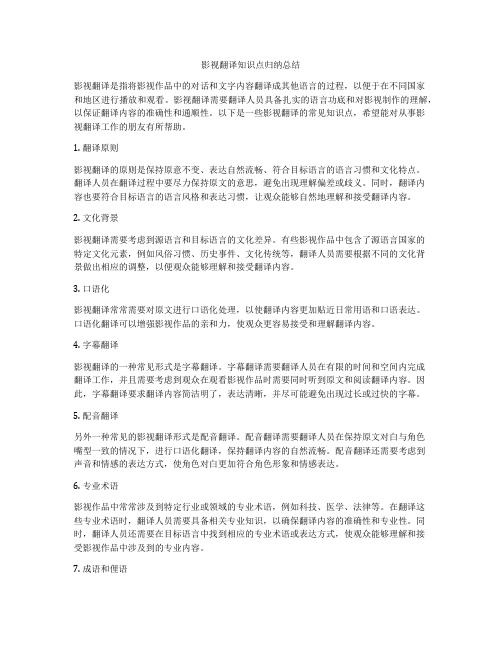
影视翻译知识点归纳总结影视翻译是指将影视作品中的对话和文字内容翻译成其他语言的过程,以便于在不同国家和地区进行播放和观看。
影视翻译需要翻译人员具备扎实的语言功底和对影视制作的理解,以保证翻译内容的准确性和通顺性。
以下是一些影视翻译的常见知识点,希望能对从事影视翻译工作的朋友有所帮助。
1. 翻译原则影视翻译的原则是保持原意不变、表达自然流畅、符合目标语言的语言习惯和文化特点。
翻译人员在翻译过程中要尽力保持原文的意思,避免出现理解偏差或歧义。
同时,翻译内容也要符合目标语言的语言风格和表达习惯,让观众能够自然地理解和接受翻译内容。
2. 文化背景影视翻译需要考虑到源语言和目标语言的文化差异。
有些影视作品中包含了源语言国家的特定文化元素,例如风俗习惯、历史事件、文化传统等,翻译人员需要根据不同的文化背景做出相应的调整,以便观众能够理解和接受翻译内容。
3. 口语化影视翻译常常需要对原文进行口语化处理,以使翻译内容更加贴近日常用语和口语表达。
口语化翻译可以增强影视作品的亲和力,使观众更容易接受和理解翻译内容。
4. 字幕翻译影视翻译的一种常见形式是字幕翻译。
字幕翻译需要翻译人员在有限的时间和空间内完成翻译工作,并且需要考虑到观众在观看影视作品时需要同时听到原文和阅读翻译内容。
因此,字幕翻译要求翻译内容简洁明了,表达清晰,并尽可能避免出现过长或过快的字幕。
5. 配音翻译另外一种常见的影视翻译形式是配音翻译。
配音翻译需要翻译人员在保持原文对白与角色嘴型一致的情况下,进行口语化翻译,保持翻译内容的自然流畅。
配音翻译还需要考虑到声音和情感的表达方式,使角色对白更加符合角色形象和情感表达。
6. 专业术语影视作品中常常涉及到特定行业或领域的专业术语,例如科技、医学、法律等。
在翻译这些专业术语时,翻译人员需要具备相关专业知识,以确保翻译内容的准确性和专业性。
同时,翻译人员还需要在目标语言中找到相应的专业术语或表达方式,使观众能够理解和接受影视作品中涉及到的专业内容。
“视译法”在本科口译教学中的应用探析
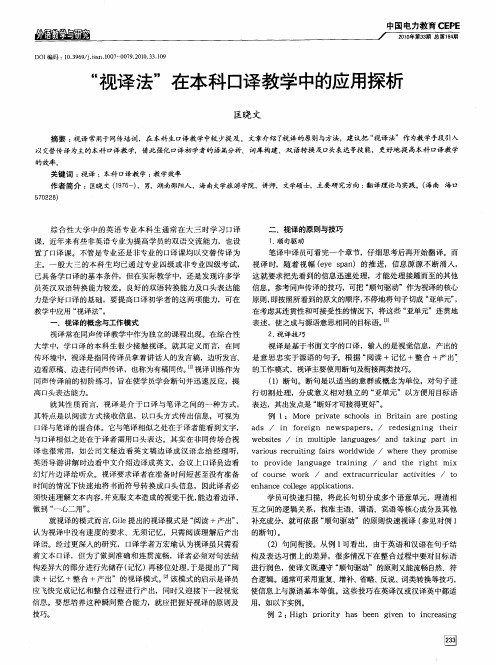
阅读 +记忆 +整合 +产出” 传环境 中,视译是指同传译员拿着 讲话人的发言 稿,边听发言、 是意 思忠实于源语 的句子。根 据 “
边看原稿 、边进行同声传译 ,也称为有稿 同传。 视译训练作为 的工作模式 ,视译主要使用断句及衔接两类技巧。 同声传译前的初 阶练习,旨在 使学员学会 断句 并迅速反 应,提
高 口头表 达 能力 。
()断句。断句是以适当的意群或概 念为单位 ,对 句子 进 1
行 切割处 理,分成 意义相对 独立 的 “ 亚单元” 以方便用 目标 语
例 1 Moe p iae sh os i rti r otn : r r t c o l n B i n a e p sig v a
a iu e r i n ar rd d t e et y po s 译 也很常用,如 公司文秘边 看英 文稿 边译成 汉语 念给 经理 听, v ro s r c u i g fis w o l w ie / wh r he r m ie
o r vi e a a e ri n nd he i t x 英语导游 讲解时边看 中文介绍边译成英文 ,会议上 1译员边 看 t p o d l ngu g t a ni g / a t rgh mi 3
就 其 性 质 而 言 ,视 译 是 介 于 口译 与 笔 译 之 间 的 一 种 方 式 , 表达 ,其出发点是 “ 断好才可接得更好” 。
其特点是以阅读方 式接收信息,以 口头方 式传 出信息 ,可视为
口译与笔译 的混 合体 。它与笔译相似之处在于译者能 看到文字 , a s / i f r i ne p pe s d n o e gn ws a r ,/ r de i e s gni t i ng he r 与口译相似之处在于译 者需用 口头表达。其实 在非 同传场合视 we ie / i mu tpe a gu ge/ a t k ng a t n bst s n li l l n a s nd a i p r i
视译单位之间的衔接
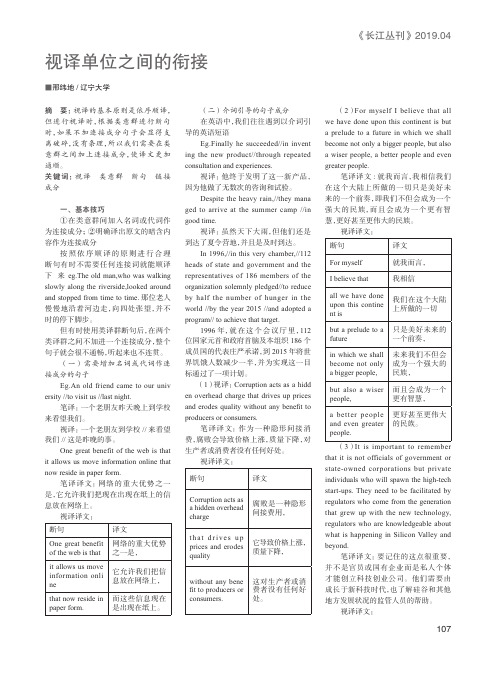
《长江丛刊》2019.04
视译单位之间的衔接
■邢纬地 / 辽宁大学
摘 要:视译的基本原则是依序顺译, 但 进 行 视 译 时,根 据 类 意 群 进 行 断 句 时,如 果 不 加 连 接 成 分 句 子 会 显 得 支 离 破 碎,没 有 条 理,所 以 我 们 需 要 在 类 意 群 之 间 加 上 连 接 成 分,使 译 文 更 加 通顺。 关 键 词:视 译 类 意 群 断 句 链 接 成分
consumers.
处。
(2)For myself I believe that all we have done upon this continent is but a prelude to a future in which we shall become not only a bigger people, but also a wiser people, a better people and even greater people.
笔译译文 : 就我而言,我相信我们 在这个大陆上所做的一切只是美好未 来的一个前奏,即我们不但会成为一个 强 大 的 民 族,而 且 会 成 为 一 个 更 有 智 慧,更好甚至更伟大的民族。
视译译文:
断句
译文
For myself
就我而言,
I believe that
我相信
all we have done upon this contine nt is
我们在这个大陆 上所做的一切
but a prelud which we shall 未来我们不但会 become not only 成为一个强大的 a bigger people, 民族,
- 1、下载文档前请自行甄别文档内容的完整性,平台不提供额外的编辑、内容补充、找答案等附加服务。
- 2、"仅部分预览"的文档,不可在线预览部分如存在完整性等问题,可反馈申请退款(可完整预览的文档不适用该条件!)。
- 3、如文档侵犯您的权益,请联系客服反馈,我们会尽快为您处理(人工客服工作时间:9:00-18:30)。
所谓视译就是看着中文稿不间断地口头翻译成英文或看着英文稿不间断地口头翻译成中文。
视译是同声传译中最常用的训练方法之一。
如果议员视译与和发言人保持同步,这种方式就是同声传译中的“带稿同传”。
现在视译训练的科学合理性已经得到了充分的证明和广泛的认可,所以视译练习也越来越多地被用于交替传译的培训中。
视译中常用的方法。
一、断句
所谓断句是指将英语或汉语句子按照适当的意群或概念单位,进行切割处理并译成汉语或英语。
例如:
I come to China /at an important time.
译:我来到中国访问,正逢一个重要的时刻。
They built the bridge /in two months.
译:他们建这座桥,只花了两个月。
Aristotle,/the greatest of the ancient Greek writers,/had written a work /containing all the knowledge of his time.
译:亚里士多德是最伟大的古希腊作家,曾写过一部著作,囊括了同时代所有的知识。
请允许我/作自我介绍。
译:Pleas allow me /to introduce myself.
我很乐意/为您排忧解难。
译:I am very glad/ to help you out.
6.今晚/公司总经理李先生/将设宴为您洗尘。
译:Tonight/ Mr.Li, MD of the company /will host a reception banquet for you.
二、等待:是指在视中有意识地等一下,等到上下文比较清楚时再开口翻译。
1.They are trying hard to realize the objective of modernization /and democratization.
译:他们正在努力实现(等一下)现代化和民主化的目标。
2.There remains a sizable gap between aspiration/ and accomplishment.
译:愿望与成果之间仍有相当大的差距。
3.We know that oxygen is necessary for the breathing of animals and plants, and for burning.
译:我们知道氧气对于动植物的呼吸和燃烧是必不可少的。
4.我叫洪建信,是中美制药有限公司的副总经理。
译:I am Hong Jianxin, deputy MD of the Sino-American Pharmaceutical Co,.Ltd.
5.我为能在上海接待您和您的家人而深感愉快,我很高兴我们能在今后的半年里合作共事。
译:I am very glad to receive you and your family in Shanghai and I am very happy to work with you for the second half of the year.
三、转换
转换指词类变换。
英语中非动词可以转换成汉语动词,如英语名词、介词、形容词和副词等都可以转换成汉语动词。
1.Every state is the best judge of what is required to safeguard its national security.
译:每个国家自己才能最好地判断需要什么来保卫自己的国家安全。
2.The chairman of the working group has given a report on the work of the group.
译:工作组主席汇报了改组的工作。
3.感谢你为我们所作的如此精心的安排。
译:Thank you for your thoughtful arrangements.
四、重复
重复也是视译中常用的技巧。
重复可以出于各种目的,如语法、修辞、突出重点等。
1.I hope the meeting will not be too long ,for it will only waste time.
译:我希望这次会议不要开得太久,太久(这)会浪费时间。
2.He left for London as soon as he received the instruction from his boss.
译:他启程去了伦敦。
收到老板的指示之后他就动身了。
五、增补
中文重意合,英文重形合,这一特点意味着中译英时,需做许多增补。
如,“他不干我干,” 译成中文时,就要判断出上下文所确定的准确含义,并增加相应的连接词,即假设关系:“(如果)他不干,我干”;因果关系:“(因为)他不干,我干”。
还有其它种种关系。
英译中增补也是必不可少的方法。
1.Implementation of international human rights standards must be pursued with vigor.
译:贯彻国际人权标准的工作必须大力进行。
2.United Nations system organizations differ in terms of mandates, structure and professional capacity.
译:联合国系统组织各有差异,在职权、结构、和业务方面都是如此。
3.Primary attention should be given to science and technology for development.
译:要优先关注科学技术促进发展问题。
4.有朋自远方来,不亦乐乎?
译:I am so delightful to have a friend from afar.
六、省略
原话中有些短语或词汇,在译语中不必翻译出来。
1.The country has increased its overall strength.
译:该国综合国力大增。
2.Will all those who are in favor of this draft resolution, please raise your hands ?
译:赞成的请举手。
3..如果我们没有社会与政治稳定的国内环境,没有和平与发展的国际环境,没有中外经济与技术合作,我们的这次重大改革是不可能奏效的。
译:Without a domestic environment with social and political stability, without an international environment with peace and development, without economic and technological cooperation with other countries, our reform won’t achieve the anticipated results.
七、反说
1.I couldn’t agree with you more.
译:我完全同意你的意见。
2.We shall decide on procedural matters before we start a general debate.
译:我们将决定程序问题,然后再开始一般性辩论。
3.No nation can live in peace without theses principles.
译:任何国家要和平生存就必须遵守这些原则。
